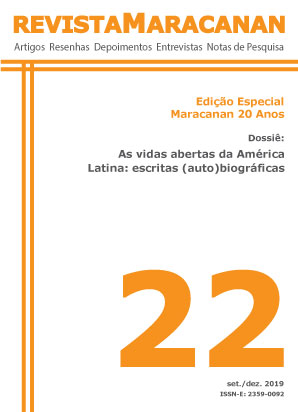“Tener mi vida organizada por otros”. Biografía y ficción en "Magnetizado", de Carlos Busqued
DOI:
https://doi.org/10.12957/revmar.2019.40184Palavras-chave:
Biografía, Autobiografía, Ficción, ConversaciónResumo
Este artículo aborda Magnetizado como un libro en el que, de manera heterodoxa, se cuenta una vida; es decir, se lo lee como un texto biográfico. En relación con esto, se estudia la rareza de este libro y se pone en relación esa supuesta cualidad con la rareza de la vida que en él se cuenta: la del asesino serial Ricardo Melogno. En este sentido, se discute además la pertinencia de calificar Magnetizado como un libro sin antecedentes previos: ¿estamos efectivamente ante un libro raro, sin género, sin tradición, sin modelo? Asimismo, se lo considera en relación con las propuestas de Josefina Ludmer sobre la postautonomía que se verificaría en ciertas escrituras del presente como así también en vínculo con la noción de inespecificidad del arte contemporáneo propuesta más recientemente por Florencia Garramuño. Finalmente, a partir de las precisiones de Jacques Rancière sobre la ficción entendida como construcción y no como mentira o falsificación se especula acerca de la necesaria u obligatoria índole ficcional de este texto y, también, acerca de cómo su autor se posiciona culposamente ante esa necesidad de ordenamiento – de ficcionalización – que todo texto biográfico, por más heterodoxo que sea, inevitablemente involucra.
Referências
BUSQUED, Carlos. Magnetizado. Buenos Aires: Anagrama, 2018.
GIORGI, Gabriel. Formas comunes. Animalidad, cultura, biopolítica. Buenos Aires: Eterna Cadencia, 2014.
GARRAMUÑO, Florencia. Mundos en común. Ensayos sobre la inespecificidad en el arte. Buenos Aires: FCE, 2015.
SPERANZA, Gabriela. Mundo animal. Otra Parte, [s.n.t.], 2009.
SPERANZA, Graciela. El libro de la semana: Magnetizado de Carlos Busqued. Telam Cultura, 30 mar. 2018. Disponible en: https://www.telam.com.ar/notas/201803/265542-libro-semana-graciela-speranza-magnetizado.html.
PODLUBNE, Judith. Presentación: Un arte vulnerable. La biografía como forma. Orbis Tertius, v. 23, n. 27, ed. 072, 2018. Disponible en: http://www.memoria.fahce.unlp.edu.ar/art_revistas/pr.8606/pr.8606.pdf.
MORENO, María. Doble casetera. Página/12, Radar, Suplemento cultural, 24 oct. 2010. Disponible en: https://www.pagina12.com.ar/diario/suplementos/radar/9-6558-2010-10-24.html.
GIORDANO, Alberto. Manuel Puig, La conversación infinita. Rosario: Beatriz Viterbo, 2003.
BARTHES, Roland. Presentación. En: Un mensaje sin código. Ensayos completos en Communications. Buenos Aires: Godot, 2017.
ARFUCH, Leonor. La entrevista, una invención dialógica. Barcelona: Paidós, 1995.
ARFUCH, Leonor. El espacio biográfico: dilemas de la subjetividad contemporánea. Buenos Aires: Fondo de Cultura Económica, 2002.
LOUREIRO, Ángel. Autobiografía: el rehén singular y la oreja invisible. En: RUSOTTO, M. (comp. y ed.). La ansiedad autorial: formación de la autoría femenina en América Latina. Venezuela: Equinoccio-Universidad Simón Bolívar, 2006.
BUTLER, Judith. Dar cuenta de sí mismo. Violencia, ética y responsabilidad. Buenos Aires: Amorrortu, 2009.
BORGES, Jorge Luis. El escritor argentino y la tradición. Discusión; Obras Completas. Buenos Aires, Emecé, 1957.
LEVRERO, Mario. La novela luminosa. Buenos Aires: Random House, 2008.
ROBERT, Marthe. Novela de los orígenes y orígenes de la novela. Madrid: Taurus, 1973.
LUDMER, Josefina. Literaturas postautónomas. Publicado en: 2006. Disponible en: https://palabraimageninfod.files.wordpress.com/2015/07/literaturas-postautc3b3nomas-ludmer.pdf
FOUCAULT, Michel. La vida de los hombres infames. Buenos Aires: Caronte, 2008.
RANCIÈRE, Jacques. La fábula cinematográfica. Buenos Aires: Paidós, 2005.
Downloads
Publicado
Como Citar
Edição
Seção
Licença
Os autores mantêm os direitos autorais e concedem à Revista Maracanan o direito de publicação, sob uma Licença Creative Commons Atribuição 4.0 Internacional, a qual permite que outros distribuam, remixem, adaptem e criem a partir do seu trabalho, mesmo para fins comerciais, desde que lhe atribuam o devido crédito pela criação original.
Os dados e conceitos abordados são da exclusiva responsabilidade do autor.
A Revista Maracanan está licenciada com uma Licença Creative Commons Atribuição 4.0 Internacional.





